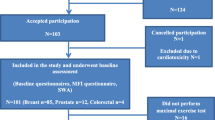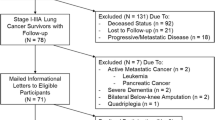Abstract
Background
Diminished cardiorespiratory fitness is a well-known side effect of chemotherapy as well as a risk factor for potential cardiovascular diseases among cancer patients. This study aimed to assess the potential effects of systemic adjuvant (ACT) or neoadjuvant (NACT) chemotherapy on cardiorespiratory fitness and quality of life (QoL) among breast cancer (BC) patients.
Methods
Demographic data, cardiorespiratory fitness, health-related QoL domains were assessed with simple data form, six-minute walk test (6MWT), European Organization for Research and Treatment of Cancer quality of life module (EORTC-C30), and Functional Assessment of Cancer Therapy (FACT-B+), respectively. Time1 (T1, prior to chemotherapy), Time2 (T2; interim assessment), and Time3 (T3, final assessment) were set as assessment points.
Results
A total of 42 patients (32 ACT vs 10 ACT) completed all assessments. There were no significant differences of main effect of time and time*group interaction on total walked distance (TWD) after controlling for age and BMI (F(2,28) = 1.309, p = 0.286; F(2,28) = 1.444, p = 0.253). EORTC symptoms subscale was found to be correlated with EORTC and FACT-B+ physical function (PF) subscales (r = − 861, p < 0.001; r = − 0.877, p < 0.001) in T3. The EORTC PF subscale was found to be correlated with the TWD in the baseline (r = 0.411, p = 0.024).
Conclusions
This study showed that the effect of chemotherapy on diminished PF and remarkably increased symptom burden among BC patients. Yet, the type of chemotherapy had no effect on TWD regarding cardiorespiratory fitness. Monitoring potential functional decline regarding cardiorespiratory fitness can be performed via simple field tests such as 6MWT.

Similar content being viewed by others
References
Society, A.C. How common is breast cancer? Breast cancer statistics 20190, 2020.
Wang L, et al. Long-term recurrence rate and survival in different aged patients with breast cancer undergoing breast conserving therapy. Chin J Surg. 2020;59(2):E007–E007.
Abraham HG, Xia Y, Mukherjee B, Merajver SD. Incidence and survival of inflammatory breast cancer between 1973 and 2015 in the SEER database. Breast Cancer Res Treat. 2021;185(1):229–38.
Stan D, Loprinzi CL, Ruddy KJ. Breast cancer survivorship issues. Hematol Oncol Clin N Am. 2013;27(4):805–27.
Nicolazzi M, Carnicelli A, Fuorlo M, Scaldaferri A, Masetti R, Landolfi R, et al. Anthracycline and trastuzumab-induced cardiotoxicity in breast cancer. Eur Rev Med Pharmacol Sci. 2018;22(7):2175–85.
Patnaik JL, Byers T, DiGuiseppi C, Dabalea D, Denberg TD. Cardiovascular disease competes with breast cancer as the leading cause of death for older females diagnosed with breast cancer: a retrospective cohort study. Breast Cancer Res. 2011;13(3):1–9.
Mertens AC, Liu Q, Neglia JP, Wasilewski K, Leisenring W, Armstrong GT, et al. Cause-specific late mortality among 5-year survivors of childhood cancer: the Childhood Cancer Survivor Study. J Natl Cancer Inst. 2008;100(19):1368–79.
Cai F, Luis MAF, Lin X, Wang M, Cai L, Cen C, et al. Anthracycline-induced cardiotoxicity in the chemotherapy treatment of breast cancer: preventive strategies and treatment. Mol Clin Oncol. 2019;11(1):15–23.
Kibudde S, Mondo CK, Kibirige D, Walusansa V, Orem J. Anthracycline induced cardiotoxicity in adult cancer patients: a prospective cohort study from a specialized oncology treatment centre in Uganda. Afr Health Sci. 2019;19(1):1647–56.
Díaz-Balboa E, González-Salvado V, Rodríguez-Romero B, Martínez-Monzonís A, Pedreira-Pérez M, Palacios-Ozores P, et al. A randomized trial to evaluate the impact of exercise-based cardiac rehabilitation for the prevention of chemotherapy-induced cardiotoxicity in patients with breast cancer: ONCORE study protocol. BMC Cardiovasc Disord. 2021;21(1):1–12.
But-Hadzic J, Dervisevic M, Karpljuk D, Videmsek M, Dervisevic E, Paravlic A. Sixminute walk distance in breast cancer survivors—a systematic review with metaanalysis. Int J Environ Res Public Health. 2021;18(5):2591.
Cantarero-Villanueva I, et al. The minimal clinically important difference in the treadmill six-minute walk test in active women with breast cancer during and after oncological treatments. Disability and rehabilitation. 2023;45(5):871–878.
Galvez M, Castaneda CA, Sanchez J, Castillo M, Rebaza LP, Calderon G, et al. Clinicopathological predictors of long-term benefit in breast cancer treated with neoadjuvant chemotherapy. World J Clin Oncol. 2018;9(2):33.
Mohapatra M, Sarma YS. A study on clinico-pathological assessment of response to neoadjuvant chemotherapy in breast carcinoma. J Cancer Res Ther. 2020;16(6):1419.
Xie X, Li H, Wang C, Lie W, Xie D, Li M, et al. Effect of modified radical mastectomy combined with neo-adjuvant chemotherapy on postoperative recurrence rate, negative emotion, and life quality of patients with breast cancer. Am J Transl Res. 2022;14(1):460.
O’Halloran N, Lowery A, Curran C, McLaughlin R, Malone C, Sweeney K, et al. A review of the impact of neoadjuvant chemotherapy on breast surgery practice and outcomes. Clin Breast Cancer. 2019;19(5):377–82.
Akin S, Kas GC. Investigation of the relationship among fatigue, self-efficacy and quality of life during chemotherapy in patients with breast, lung or gastrointestinal cancer. Eur J Cancer Care. 2019;28(1): e12898.
ATS statement: guidelines for the six-minute walk test. ATS committee on proficiency standards for clinical pulmonary function laboratories. Am J Respir Crit Care Med. 2002;166(1):111–7.
Schmidt K, Vogt L, Thiel C, Jäger E, Banzer W. Validity of the six-minute walk test in cancer patients. Int J Sports Med. 2013;34(07):631–6.
Aaronson, N.K, Ahmedzai S, Bergman B, Bullinger M, Cull A, Duez NJ, et al. The European Organization for Research and Treatment of Cancer QLQ-C30: a quality-oflife instrument for use in international clinical trials in oncology. J Natl Cancer Inst. 1993;85(5):365–76.
Brady MJ, Cella DF, Mo F, Bonomi AE, Tulsky DS, Lloyd SR, et al. Reliability and validity of the functional assessment of cancer therapy-breast quality-of-life instrument. J Clin Oncol. 1997;15(3):974–86.
Kang H. The prevention and handling of the missing data. Korean J Anesthesiol. 2013;64(5):402–6.
Enright PL, Sherrill DL. Reference equations for the six-minute walk in healthy adults. Am J Respir Crit Care Med. 1998;158(5):1384–7.
Cantarero-Villanueva I, Fernández-Lao C, Díaz-Rodríguez L, Fernández-de-Las-Peñas C, Ruiz JR, Arroyo-Morales M. The handgrip strength test as a measure of function in breast cancer survivors: relationship to cancer-related symptoms and physical and physiologic parameters. Am J Phys Med Rehabil. 2012;91(9):774–82.
Galiano-Castillo N, Arroyo-Morales M, Ariza-Garcia A, Sánchez-Salado C, Fernández-Lao C, Cantarero-Villanueva I, et al. The six-minute walk test as a measure of health in breast cancer patients. J Aging Phys Act. 2016;24(4):508–15.
Ying L, Yahng JMJ, Fisher M, Simons K, Nightingale S. Walking the boundaries: using the 6- min walk test for accurate assessment of the level of fitness in breast clinic outpatients. ANZ J Surg. 2020;90(6):1141–5.
Ortiz A, Tirado M, Hughes DC, Gonzalez V, Song J, Mama SK, et al. Relationship between physical activity, disability, and physical fitness profile in sedentary Latina breast cancer survivors. Physiother Theory Pract. 2018;34(10):783–94.
Gewandter JS, Fan L, Magnuson A, Mustian K, Peppone L, Heckler C, et al. Falls and functional impairments in cancer survivors with chemotherapy-induced peripheral neuropathy (CIPN): a University of Rochester CCOP study. Support Care Cancer. 2013;21(7):2059–66.
Granger CL, et al. Minimal important difference of the 6-minute walk distance in lung cancer. Chron Respir Dis. 2015;12(2):146–54.
Falz R, et al. Effects and duration of exercise-based prehabilitation in surgical therapy of colon and rectal cancer: a systematic review and meta-analysis. J Cancer Res Clin Oncol. 2022 Sep;148(9):2187–2213
Mascherini G, Tosi B, Giannelli C, Grifoni E, Degl’Innocenti S, Galanti G. Breast cancer: effectiveness of a one-year unsupervised exercise program. J Sports Med Phys Fit. 2018;59(2):283–9.
Vardar-Yagli N, Sener G, Saglam M, Calik-Kutukcu E, Arikan H, Inal Ince D, et al. Associations among physical activity, comorbidity, functional capacity, peripheral muscle strength and depression in breast cancer survivors. Asian Pac J Cancer Prev. 2015;16(2):585–9.
Van der Gucht, E., Dams L, Meeus M, Devoogdt N, Beintema A, Penen F, et al. Kinesiophobia contributes to pain-related disability in breast cancer survivors: a crosssectional study. Support Care Cancer. Sep;28(9):4501-4508 2020;1–8.
Akezaki Y, Nakata E, Kikuuchi M, Tominaga R, Kurokawa H, Okamoto M, et al. Investigation of factors affecting early quality of life of patients after breast cancer surgery. Healthcare (Basel). 2021. MDPI.
Lewandowska A, Rudzki G, Lewandowski T, Próchnicki M, Rudzki S, Laskowska B, Brudniak J. Quality of life of cancer patients treated with chemotherapy. Int j environ res public health. 2020;17(19):6938
Acknowledgements
The authors would like to thank patients who voluntarily participated in this study.
Funding
None.
Author information
Authors and Affiliations
Corresponding author
Ethics declarations
Conflict of interest
Author A.T. declares that he has no conflict of interest. Author Z.A. declares that he has no conflict of interest. Author M.A. declares that he has no conflict of interest. Author Y.B. declares that he has no conflict of interest. Author A.T. declares that he has no conflict of interest.
Ethical approval
This study was approved by Izmir Bakircay University Ethical Board of Clinical Studies with the 208/190/04032021. All procedures performed in studies involving human participants were in accordance with the ethical standards of the institutional and/or national research committee and with the 1964 Helsinki declaration and its later amendments or comparable ethical standards.
Informed consent
Signed informed consent was taken for each participant.
Additional information
Publisher's Note
Springer Nature remains neutral with regard to jurisdictional claims in published maps and institutional affiliations.
About this article
Cite this article
Akyol, M., Tuğral, A., Arıbaş, Z. et al. Assessment of the cardiorespiratory fitness and the quality of life of patients with breast cancer undergoing chemotherapy: a prospective study. Breast Cancer 30, 617–626 (2023). https://doi.org/10.1007/s12282-023-01453-6
Received:
Accepted:
Published:
Issue Date:
DOI: https://doi.org/10.1007/s12282-023-01453-6




